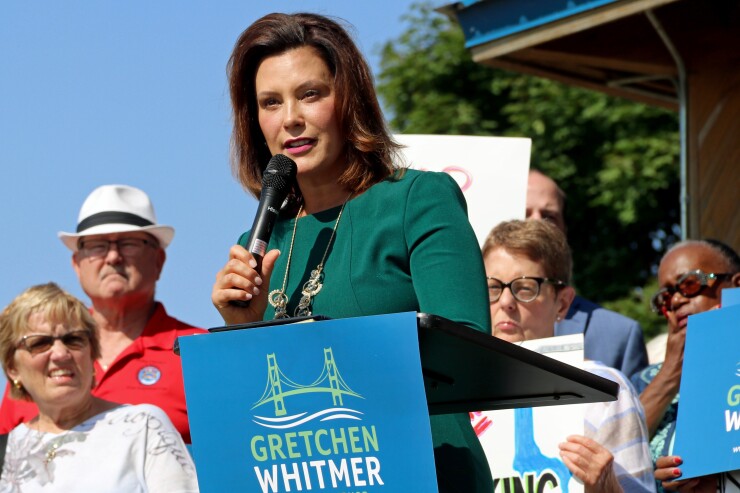In her first State of the State speech, Michigan Gov. Gretchen Whitmer had a lot to say about what she wants to do but no details on how to pay for it.
Whitmer campaigned on the same promises she outlined in the Tuesday night address. She reiterated her commitment to investing in solutions to problems that have been decades in the making after underinvestment across multiple administrations.

“Incremental fund shifts, like we’ve seen in recent years, don’t fix the problem," Whitmer said. "They only slow our decline. And I didn’t run for governor to manage the decline of our state. I ran to make sure this state is one where our kids stay and families thrive.”
Whitmer also pledged to tackle the “serious problems” with Michigan’s drinking water and also pledged to tackle the state’s “crisis” in education and workplace skills.
“These challenges aren’t the fault of any one politician or party,” Whitmer said. “I spent 14 years in the legislature, so I know how tough it is to keep the government funded and functioning. But I also know this: turning a blind eye or passing phony fixes won’t solve problems. In fact, they make it harder.”
Details must come later.
“Next month, I will propose a budget for our state," Whitmer said. "My budget will offer a real solution to fixing our roads and rebuilding our infrastructure. It will give our frontline educators the tools they need to address our literacy crisis.”
“In nearly every public opinion poll of the past few years, fixing roads and other infrastructure has been the top concern of Michigan voters,” Lance Binoniemi, vice president of government affairs for the Michigan Infrastructure and Transportation Association, said in a statement. “A real long-term solution is what voters expect from the new legislature, not another Band-Aid.”
The newly elected Democratic governor will face a legislature controlled by the GOP.
House Speaker Lee Chatfield, R-Levering, and Senate Majority Leader Mike Shirkey, R-Clarklake, said the governor’s message stayed true to her campaign message and likely pleased “the base of one party.”
Both Chatfield and Shirkey said they largely embrace the priorities Whitmer outlined but have differences on how. "The campaign trail has ended and now it's time to govern," said Chatfield. "You need specificity, and you need details."
Shirkey said that when it comes to road funding, state leaders must first identify a clear goal, establish what can be accomplished with existing revenue and then look at other revenue options. “There's no way we're going to fix this problem that's been 50 years in the making without coming up with new revenues for infrastructure," said Shirkey.
Whitmer has said she wanted $2 billion a year in new spending for infrastructure and another $1 billion in annual federal funding. The plan relies on raising revenue through increased fees or taxes. If that fails, Whitmer has proposed raising the funds through bonding.
A $1.2 billion 2015 road funding deal, which will be fully implemented in 2021 when general fund spending for roads hits $600 million, included a 20% increase in vehicle registration fees and a 7.3-cent-per-gallon increase in fuel taxes.
“What we've been saying since 2015, when the last package was passed, is that we need more money to stop the slide of our pavement condition,” said Paul Ajegba, the new director of the Michigan Department of Transportation. “That has not changed.”
Michigan is rated AA by both Fitch Ratings and S&P Global Ratings. Moody's Investors Service rates the state Aa1.





